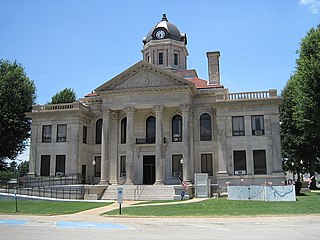
Poinsett County is a county located in the U.S. state of Arkansas. As of the 2020 census, the population was 22,965. The county seat is Harrisburg. Poinsett County is included in the Jonesboro–Paragould Combined Statistical Area.

Mississippi County is the easternmost county in the U.S. state of Arkansas. As of the 2020 census, the population was 40,685. There are two county seats, Blytheville and Osceola. The county is named for the Mississippi River which borders the county to the east. Mississippi County is part of the First Congressional District in Arkansas.

Jonesboro is a city located on Crowley's Ridge in the northeastern corner of the U.S. State of Arkansas. Jonesboro is one of two county seats of Craighead County. In 2023, the city had an estimated population of 80,560, making it the fifth-most populous city in Arkansas. In 2020, the Jonesboro metropolitan area had a population of 134,196, and the Jonesboro-Paragould Combined Statistical Area had a population of 179,932.

Ashdown is a city in Little River County, Arkansas, United States. The community was incorporated in 1892 and has been the county seat since 1906. Located within the Arkansas Timberlands between the Little River and the Red River, Ashdown's economy and development have historically been tied to the timber industry. Timber is still a major industry here.
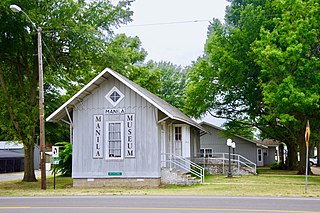
Manila is a city in Mississippi County, Arkansas, United States. The population was 3,682 at the 2020 census, up from 3,342 in 2010. It was the hometown of World War I sniper Herman Davis.

Prescott is a city and the county seat of Nevada County, Arkansas, United States. The community had a population of 3,296 at the 2010 census. Prescott is part of the Hope Micropolitan Statistical Area.
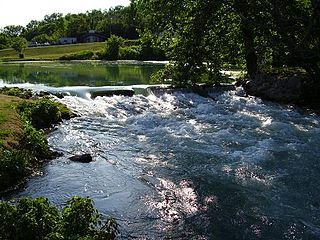
Mammoth Spring State Park is a 62.5-acre (25.3 ha) Arkansas state park in Fulton County, Arkansas in the United States. The park is located surrounding National Natural Landmark of the same name to provide recreation and interpretation for visitors. The park offers fishing, boating and hiking in addition to an Arkansas Welcome Center and restored 1886 Kansas City, Fort Scott and Memphis Railroad depot operating as a railroad museum. The site became a state park in 1957, but the park continued to add area until 1975.
Armorel is an unincorporated community and census-designated place (CDP) in Mississippi County, Arkansas, United States. As of the 2020 census, it had a population of 312. It is in a largely rural area with most of its land devoted to forests and farms. Most of the town lies between Arkansas highways 18 and 312. The town's name was formed from the abbreviations of Arkansas and Missouri, along with the first three initials of its founder, Wilson.

The Delta Valley and Southern Railway is a short-line railroad headquartered in Wilson, Arkansas.

The Jonesboro, Lake City and Eastern Railroad (JLC&E) was a short-line railroad that operated in Mississippi and Craighead counties of northeast Arkansas. This railroad received a charter from the state of Arkansas on April 7, 1897, and track construction between Jonesboro and Blytheville began soon thereafter.

Arkansas's 1st congressional district is a U.S. congressional district in eastern Arkansas that elects a representative to the United States House of Representatives. It is currently represented by Republican Rick Crawford. With a Cook Partisan Voting Index rating of R+22, it is the most Republican district in Arkansas, a state with an all-Republican congressional delegation.
Illinois Central Railroad Depot, and variations, may refer to:

Baton Rouge station is a historic train station located at 100 South River Road in downtown Baton Rouge, Louisiana. It was built for the Yazoo and Mississippi Valley Railroad which got absorbed by the Illinois Central Railroad. The station was a stop on the Y&MV main line between Memphis, Tennessee and New Orleans, Louisiana. The building now houses the Louisiana Art and Science Museum.
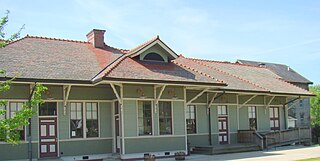
Stanford L&N Railroad Depot, also known as Baughman's Mill and Stanford Railroad Depot, is a historic train depot located in Stanford, Kentucky. It was built in 1911 and was used by the Louisville and Nashville Railroad.
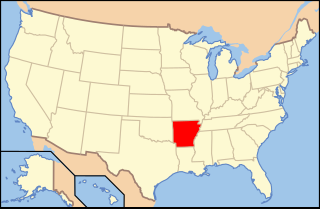
The following is an alphabetical list of articles related to the U.S. State of Arkansas.
A Mississippi Landmark is a building officially nominated by the Mississippi Department of Archives and History and approved by each county's chancery clerk. The Mississippi Landmark designation is the highest form of recognition bestowed on properties by the state of Mississippi, and designated properties are protected from changes that may alter the property's historic character. Currently there are 890 designated landmarks in the state. Mississippi Landmarks are spread out between eighty-one of Mississippi's eighty-two counties; only Issaquena County has no such landmarks.

The Ontario station is a former train station located in Ontario, Oregon, United States that is listed on the National Register of Historic Places as the Oregon Short Line Railroad Depot. It was constructed in 1907 by the Union Pacific Railroad (UP) for its subsidiary, the Oregon Short Line Railroad (OSL), to replace an 1885 OSL depot that had been located just to the south and had been a simple wood-frame structure. The building is made of concrete block cast to imitate stone, and with red brick trim and other ornamental features. The City of Ontario purchased the building from UP in 1996, but as of 1999 the land remained owned by UP and was being leased to the city. The station was added to the NRHP in 1999.

Lost Creek station is a historic railroad depot located at Lost Creek, Harrison County, West Virginia. It was built in 1892 by the Baltimore and Ohio Railroad, and is a one-story, Folk Victorian frame building with board-and-batten siding. It measures 44 by 18.5 feet. In 1923, it was the largest cattle shipping point east of the Mississippi River.

Lake Waccamaw Depot is a historic train station located at Lake Waccamaw, Columbus County, North Carolina It was built about 1900 by the Atlantic Coast Line Railroad, and is a one-story, Stick Style frame building with board-and-batten siding. It features shaped eave brackets, gable braces, and a long low slate covered gabled roof. The building was moved to its present location in 1974. Also on the property is the contributing a rectangular board-and-batten covered Section House.
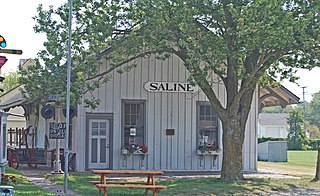
The Saline station, also known as the Detroit, Hillsdale and Indiana Railroad-Saline Depot, is a former railroad depot located at 402 North Ann Arbor Street in Saline, Michigan. It was listed on the National Register of Historic Places in 1994. The building now houses the Saline Depot Museum.



















